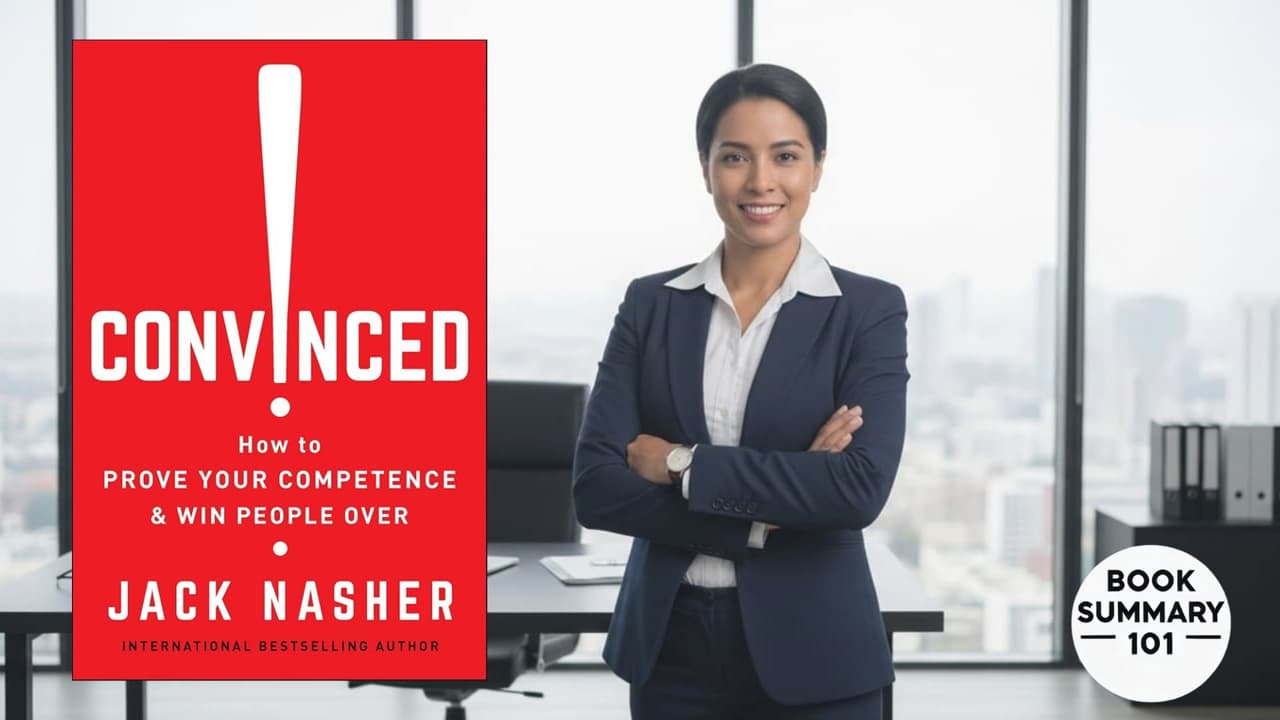We have all been there.
Imagine you’ve been busting your back at work for months. You’re the one staying late to fix the bugs, the one double-checking the spreadsheets, and the one who actually understands how the new software works. You are, objectively, the most competent person on the team.
Then, promotion season rolls around. You sit back, confident that your hard work will speak for itself.
But it doesn’t.
Instead, the promotion goes to “Dave.” You know Dave. Dave spends half the day chatting by the coffee machine and the other half making colorful PowerPoint slides that don’t actually say anything. But Dave is confident. Dave is loud. And now, Dave is your boss.
For the longest time, this dynamic drove me absolutely crazy. I thought the world was unfair. I thought, “Why can’t people see that I’m the one doing the real work?”
Then I picked up Convinced!: How to Prove Your Competence & Win People Over by Jack Nasher.
Reading this book felt like having a cold bucket of water thrown over my head—in the best way possible. It was a wake-up call. Nasher, a negotiation expert and psychologist, sat me down (figuratively speaking) and explained that I had it all wrong. Being good at your job is only half the battle. The other half? Making sure people perceive you as good at your job.
If you’re tired of being the unsung hero, grab a cup of coffee. We need to talk about why your skills are currently invisible and how to fix that.
- Why Should You Even Bother Reading It?
- The Psychological Keys to Unlocking Your Perception
- 1. The “Doctor’s Diploma” Effect (The Illusion of Competence)
- 2. The “Wine Tasting” Principle (Expectation Determines Reality)
- 3. The “Teflon Pan” Strategy (Managing Attribution)
- 4. The “Silverback” Stance (Non-Verbal Dominance)
- 5. The “Good News” Messenger (Association)
- My Final Thoughts
- Join the Conversation!
- Frequently Asked Questions (The stuff you’re probably wondering)
Why Should You Even Bother Reading It?
This book is a lifeline for the humble, the introverted, and the technically brilliant professionals who believe that “results speak louder than words.”
In today’s hyper-fast, noisy digital world, nobody has the time to deeply analyze your actual output. We are all skimming the surface. If you are a freelancer, a corporate climber, or even just someone trying to win a debate, you need this.
The core message is vital: Actual competence and perceived competence are two completely different things. If you have the first but lack the second, you lose. This book teaches you how to bridge that gap without feeling like a fraud.
The Psychological Keys to Unlocking Your Perception
Most of us operate under the delusion that people are rational judges of talent. We aren’t. We are messy, emotional, and lazy thinkers who rely on shortcuts to figure out who the “expert” is. Nasher breaks down these psychological shortcuts and hands you the keys to manipulate them (ethically, of course).
Here are the core principles that completely reshaped how I view professional success.
1. The “Doctor’s Diploma” Effect (The Illusion of Competence)
Let’s start with a hard truth: Human beings are terrible at judging actual competence.
Think about the last time you went to the doctor. Unless you also went to medical school, you actually have zero ability to judge if your doctor is a medical genius or barely passed their exams. You can’t judge their diagnosis. You can’t judge their prescription.
So, what do you judge?
You judge their bedside manner. You look at the diploma on the wall. You notice if their lab coat is white and crisp. You notice if they speak with certainty.
Nasher explains that because people cannot measure your actual skills (especially in complex fields like coding, law, or management), they use “proxies.” They look for external clues that signal competence.
The Real-World Example:
Think about Zillow’s “Zestimate.” When Zillow first launched, nobody knew if their algorithm was actually good at pricing homes. But the interface was clean, the data was presented confidently with specific numbers (e.g., “$452,391” rather than “around $450k”), and it looked authoritative. People trusted the competence of the tool because of the presentation, long before they could verify the accuracy.
Simple Terms: People can’t see inside your brain, so they judge the outside of your package.
The Takeaway: You must consciously curate the external signals of your success (dress, confidence, credentials) because that is the only data people have to work with.
2. The “Wine Tasting” Principle (Expectation Determines Reality)
Imagine I pour you a glass of wine. Before you sip it, I tell you, “This is a rare vintage from a boutique vineyard in France, costing $200 a bottle.” You taste it. You notice the oaky undertones. You love it.
Now imagine I pour the exact same wine but tell you, “I got this for $5 at the gas station.” You taste it. It tastes sour. It gives you a headache.
This is the power of Expectation.
Nasher argues that you must frame your competence before you demonstrate it. If you act humble and say, “I’m not sure if this is right, but here’s my work,” people will critically examine it looking for flaws. If you say, “I’ve spent weeks optimizing this and the results are stellar,” their brains are primed to look for brilliance.
📖 “Modesty is a virtue only for those who have no other virtues. For everyone else, it is a hindrance.”
The Real-World Example:
Consider Apple product launches. Steve Jobs never walked on stage and said, “Here is a new phone, we hope you like it.” He used words like “Revolutionary,” “Magical,” and “Unbelievable” before he even showed the device. He set the expectation so high that the audience was primed to see genius.
Simple Terms: Tell people you are good before you show them your work, and they will believe the work is good.
The Takeaway: Never downplay your work before presenting it. Set a high expectation to create a positive confirmation bias.
3. The “Teflon Pan” Strategy (Managing Attribution)
This was the hardest pill for me to swallow because it feels arrogant, but Nasher insists it is essential for perceived competence.
It’s called the Self-Serving Bias.
Research shows that we naturally attribute our own success to our internal traits (intelligence, hard work) and our failures to external factors (bad luck, the economy). However, when we look at others, we often do the reverse.
To convince people you are competent, you must actively manage this attribution.
- When things go right: You must subtlely ensure people know it was because of your skill, not luck.
- When things go wrong: You must (carefully) point to external factors.
If you are too modest when you succeed (“Oh, I just got lucky”), people believe you. If you take too much blame when you fail (“I’m sorry, I’m an idiot”), people believe you.
The Real-World Example:
Think of a CEO during an earnings call. If profits are up, they talk about their “strategic vision” and “operational excellence” (Internal). If profits are down, they talk about “headwinds in the global market” or “supply chain disruptions” (External). They act like a Teflon pan—bad stuff slides off, good stuff sticks.
Simple Terms: Own your wins completely, and contextualize your losses as circumstantial.
The Takeaway: Stop apologizing for things that aren’t your fault, and stop calling your hard-earned successes “luck.”
4. The “Silverback” Stance (Non-Verbal Dominance)
You can say you’re an expert, but if you are hunched over, fidgeting with your hands, and making your voice go up at the end of sentences? Nobody will believe you.
Nasher dives deep into the primal brain. We are social animals. We look for the “Alpha” or the leader based on how much space they take up and how calm they appear.
Anxiety is the enemy of perceived competence. Why? Because historically, if you were anxious, it meant you were in danger or didn’t know how to handle the situation. If you are calm, it signals you are in control.
📖 “Uncertainty is a competence killer. Even if you are wrong, be wrong with authority.”
The Real-World Example:
Think of a pilot announcing turbulence. If the pilot comes on the intercom and sounds shaky or nervous, the passengers panic. If the pilot sounds bored, deep-voiced, and relaxed while announcing a storm, everyone stays calm. The pilot’s actual flying skill hasn’t changed, but their voice dictates the passengers’ faith in them.
Simple Terms: Look and sound like you belong in charge, and people will put you in charge.
The Takeaway: Practice high-power poses, maintain strong eye contact, and eliminate “umms” and “ahhs” from your speech to signal authority.
5. The “Good News” Messenger (Association)
This is a fascinating psychological quirk: The Halo Effect.
People struggle to separate a message from the messenger. If you are the person always delivering bad news, people subconsciously associate you with negativity and failure. If you are the person delivering good news, you are associated with success.
Nasher suggests a strategic approach to communication. If there is a major win, make sure you are the one sending the email or making the announcement. If there is a disaster, delegate the reporting if possible, or stick strictly to the facts without emoting.
The Real-World Example:
Consider Political Press Secretaries. The President usually comes out to announce treaties, peace deals, and economic booms. The Press Secretary is often sent out to explain scandals or bad polling numbers. The leader protects their “brand” by associating mostly with positive outcomes.
Simple Terms: Be the face of success and distance yourself from the optics of failure.
The Takeaway: Strategically position yourself to be the one announcing victories to the team.
My Final Thoughts
Reading Convinced! forced me to confront a very uncomfortable reality: Modesty is not always a virtue in the professional world. In fact, it can be a form of self-sabotage.
I used to think that “selling myself” was slimy. I thought it was for used-car salesmen and politicians. But Nasher showed me that proving your competence isn’t about lying. It’s about ensuring that the truth of your skills actually lands. It’s about removing the static so people can see the clear picture of your value.
If you are great at what you do, you owe it to yourself—and your team—to look the part. Don’t let the “Dave” from the coffee machine get the promotion just because he knows how to posture. Learn the rules of the game so you can win it.
Join the Conversation!
I’d love to hear your horror stories. Have you ever watched a less skilled person get promoted over you just because they were louder or more confident? How did you handle it? Drop a comment below!
Frequently Asked Questions (The stuff you’re probably wondering)
1. Is this book about “faking it until you make it”?
No. Nasher assumes you are actually competent. The book isn’t about how to lie about skills you don’t have; it’s about how to ensure people recognize the skills you do have. It’s about alignment, not deception.
2. I’m an introvert. Will this require me to be loud and obnoxious?
Not at all. In fact, this book is arguably more useful for introverts. It teaches you subtle, psychological cues (like body language and framing) that improve your standing without you needing to be the loudest person at the bar.
3. Does this apply to creative fields or just corporate jobs?
It applies everywhere. Whether you are a graphic designer pitching a logo, a contractor bidding on a house, or a lawyer in court, the psychology of how humans judge value is universal.
4. Is the book too academic and hard to read?
Nope. Jack Nasher is a professor, but he writes for the general public. It’s full of studies, but they are explained simply with real-life examples. It’s a quick, engaging read.
5. Can I use these techniques in my personal life?
Absolutely. The principles of perceived value, confidence, and expectation work just as well on a first date or when negotiating a car purchase as they do in a boardroom.



